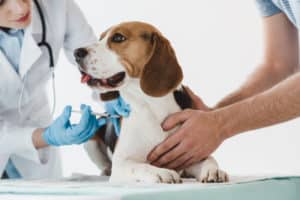Most of us have had a cold before or have felt sick. Just like humans, dogs can get sick too. Even though your dog cannot catch a cold from a human, they can catch a cold from other dogs.
Some people are not aware that dogs can even catch a cold. That is why it is important to keep a close eye on your dog’s physical well-being. If you ever notice that your dog is acting sick, it is important to call your veterinarian. Read on to understand more about cold symptoms in a dog.
How Do Dogs Get Sick with Colds?
Just like humans, there are a lot of viruses that cause cold or flu-like symptoms in your dog. If your dog meets another dog that is suffering from one of these viruses, it is possible for the infected dog to infect your dog. You should be especially vigilant if your dog goes to daycare or if they have just come home from staying in a kennel. Even a playdate with your neighbor’s dog can cause your dog to be ill if their furry friend has a cold or another illness.
About 50% of the viruses that cause colds in dogs are the rhinovirus. The rest of them are a combination of other viruses, like kennel cough or canine influenza. If your dog has a cold, it’s important to get your dog diagnosed by a vet to ensure that your dog does not have kennel cough or the distemper virus, especially if they are not vaccinated.
In addition, if your dog is sick and is under the age of six months old or is a senior, take them to the vet right away.
What Cold Symptoms Should I Watch Out For?
Dogs with a rhinovirus will exhibit many of the same symptoms that humans do. These symptoms include:
- Coughing
- Wheezing
- Sneezing
- Lethargic
- Signs of dehydration
While your pet is sick, it is important that you care for them and consult with your veterinarian. A humidifier can help ease some of your dog’s symptoms, especially a runny nose and cough. Letting your dog rest, and making sure they are still eating and drinking is also very important.

If your dog does not recover in a few days, they may need antibiotics, especially if it is a case of kennel cough. If your dog’s cough sounds like a honk, deep from their chest, it could be a case of kennel cough. Your veterinarian will make sure your dog has antibiotics, and in some cases, give your dog fluids.
If at any time, cold symptoms or not, your dog suddenly stops eating and drinking, they need to see a vet right away.
If you notice discharge coming from your dog’s eyes and nose, has a fever, and is lethargic and not eating, and has never gotten any vaccines, they could be suffering from canine distemper. This is a deadly infection that can easily be fatal if not treated. If your dog has these types of symptoms, or if your dog gets a cold and has missed a dose of the distemper vaccine, it’s best to see the vet right away.
How Can I Prevent my Dog from Getting Sick?
The easiest way to ensure your dog is safe from distemper and kennel cough, is to have them vaccinated. Puppies are much more at risk for these infections, and if your dog did have distemper as a puppy and survived, there may be long lasting side effects, such as seizures. Adult dogs do have a higher chance of surviving these illnesses, but, if possible, the ultimate protection is to be vaccinated.
Your veterinarian can put together a vaccine schedule and plan for your dog. Outside of vaccines, it’s always best practice to keep a close eye on your dog’s health, especially if they go to a daycare or boards with other dogs.

It’s best practice to work closely with your veterinarian when you adopt a new puppy or dog. Each new pet should be examined by a vet and given vaccines. If you ever notice that your dog has symptoms of a cold, don’t wait. Contact your veterinarian to develop a treatment plan to ensure your dog feels better as soon as possible.
Our veterinarians at Arrowhead Animal Hospital, are trained to provide quality and compassionate care to your pet. If you have questions regarding your dog’s health or would like to schedule an appointment with one of our skilled doctors, give us a call at (303) 469-1616. We are always here for you and are more than happy to help care for your dog with whatever you need!




